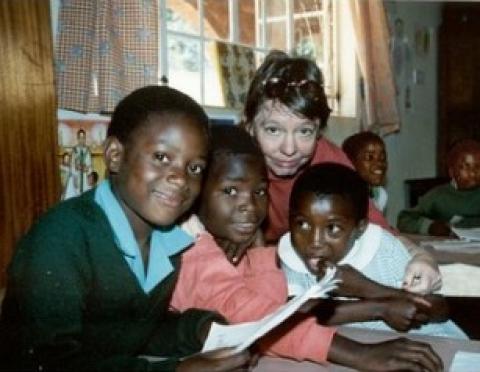
Today’s Gospel (Matthew 25: 31-46) draws us into the reality of life for so many in our world today who experience hunger, thirst, loneliness, loss of dignity, being a stranger – the list goes on. However bleak, this reality is not devoid of Christian hope – and that is the message and the meaning of this Feast of Christ, King of the Universe.
Matthew writes well of God’s intention for our world, that is, what the world would look like if God were really in charge. What does it mean that Christ is King? Pope Francis states clearly: “The kingdoms of this world at times are sustained by arrogance, rivalries and oppression; the reign of Christ is a ‘kingdom of justice, love and peace.’”
Today we encounter a Feast of Solidarity with the whole world. It calls us to acknowledge our own suffering and then to shift our perspective into one that encompasses all the suffering peoples throughout the world. In a world where God is in charge – where Jesus Christ is King of the Universe, we realize that we are not alone – we are all connected. The recognition of that connection gives birth to empathy, compassion and a call to action for the life of the world.
A trip to Gweru, Zimbabwe put “flesh” on this realization for me. One day during my visit the staff at the Maryknoll Sisters project for children orphaned by HIV/AIDS asked me to teach an English class to about 15 -20 young students. In the middle of the lesson, a young man came in and asked to speak to the children. He said that he was an orphan too and had been a street kid until he was found and taken off the streets by someone in the HIV/AIDS project. He was sent to school, worked hard and said to the kids “Now, look at me! I have an education and a job and I want to tell you that your life can turn around." He told them that right now they had a golden opportunity to set their life on a good course and begged them not to let this opportunity pass them by. They were now in a place that could help them make a choice to change the end of their story and he hoped they would make the right one.
His story touched the heart of one of the girls in the class and afterwards she shared some of her story with me. She was about 13 years old, from an abusive family situation, then orphaned by AIDS, then sexually abused by a teacher at a school she attended. Her story wrenched my heart and I asked myself: what is the future and hope for someone so hurt from the beginning of her life – hungry, robbed of dignity, no place to call home?
After class we walked to the main office where the students gathered to receive some fruit before they went home. According to their custom, a staff member asked who would like to lead the prayer before they departed. The young girl I had spoken with earlier raised her hand. As I wondered what her prayer would be, everyone bowed their heads in silence and she began “Our Father who are in heaven . . . your kingdom come, your will be done, on earth as it is in heaven. . . give us this day our daily bread . . .”
This young woman lives in the same universe as each one of us reading this reflection. We are called on this Feast to be in solidarity with her – with all those hungering for justice and peace and the courage to go on with life. As we put our lives together with our sisters and brothers throughout the world, may the words of St. Teresa ring in our hearts on this great Feast: “Christ has no body now, but yours; no hands, no feet on earth, but yours. Yours are the eyes through which Christ looks compassion into the world. Yours are the feet with which Christ walks to do good. Yours are the hands with which Christ blesses the world."
Photo: Sister Kathy Barbee, M.M. with AIDS/HIV orphans in Zimbabwe in 2013. Photo courtesy of the Maryknoll Sisters.
